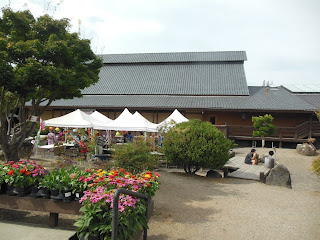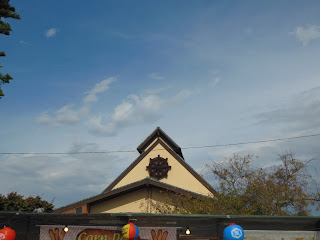First, a few words on Obon. I'm going to paraphrase the description given by The Buddhist Churches of America but you can view a more complete description on their website.
Obon is a time to celebrate our loved ones who have passed on. Some traditions of Buddhism believe that it is a time when the spirits of our loved ones can return to spend the day with us, much like Mexico's Day of the Dead (Dia de Los Muertes). In the Jodo Shinshu tradition, that belief is viewed more as a superstition, and Obon instead is a day of celebration, Kangi-e ("Gathering of Joy"). We celebrate our gratitude for those who have moved on, as well as those still with us, and all who have made contributions to our lives. It is a time to remind ourselves to live with compassion, patience, and joy. Obon Odori, is a name for the collection of special dances done by all at the Obon festival.
The Obon festival is held separate from the Obon service so everyone can respect the more solemn side of the occasion, as we all know how hard losing someone we love can be even though we can be grateful and joyful for the time we did have with them. Our service was this last weekend, so I didn't have to miss it.
The guest speaker spoke of joy and gratitude, for our loved ones and for our precious, impermanent lives. Below is a poem he read and passed out, reprinted from Discovering Buddhism in Everyday Life, by Reverend Marvin Harada. It is a poem by Scott Morris.
I have ALS- and I am grateful.
I am grateful to retire early to be with my family.
I am grateful I have family and friends that are so
supportive and hopeful.
I am grateful I can still walk and get around.
When that is gone-
I am grateful I can still use my hands to feed myself.
When that is gone-
I am grateful I can still breathe and laugh and feel.
When that is gone-
I am grateful I had a wonderful life.
And when that is gone-
Namoamidabutsu
Namo Amida Butsu can be literally translated as "I take refuge in Amida Buddha". Without getting too lengthy, let me just say that it is my very novice understanding that Jodo Shinshu Buddhism does not translate the historical Buddhist texts very literally. Amida Buddha was not the historical Buddha that walked this earth hundreds of years ago. That was Shakyamuni Buddha. It is important to note here that all Buddhas are human, are not gods, not the son (or daughter) of any god, and do not possess mystical powers.
It is said that there is a Buddha who basically reigns over each universe, and there are millions of universes. Amida Buddha is the Buddha who reigns over the Pure Land, a lot like heaven I guess, but for every living thing and every living person, regardless of personal beliefs.
But the Jodo Shinshu tradition believes that the scriptures (as well as scriptures from all religions) have stories and symbols in them that are not to be taken literally. These stories are told to us because they contain a lesson, and it is up to us to incorporate that lesson into our lives.
Amida Buddha is a symbol of compassion, and the interconnectedness of all beings and things. We recite Namo Amida Buddha to immerse ourselves in this collective compassion from which all things are made. Yes, there are parts of life we consider bad, things that are painful. But everything just is. There will be pain and suffering, and sorrow. But there will also be joy, peace, love. None of these things last forever, they are like the wind- just passing by.
Do not stand at my grave and weep
I am not there. I do not sleep.
I am a thousand winds that blow.
I am the diamond glints on snow.
I am the sunlight on ripened grain.
I am the gentle autumn rain.
When you awaken in the morning's hush
I am the swift uplifting rush
Of quiet birds in circled flight.
I am the soft stars that shine at night.
Do not stand at my grave and cry;
I am not there. I did not die.
-Mary Elizabeth Frye
The choir sang the above poem for our service as well, in Japanese.
A really good resource for those looking for a simple, easy to understand glimpse into Jodo Shinshu Buddhism is the book "Ocean" by Kenneth K. Tanaka.
Onto the Obon festival!
A friend of mine from church plays in the Chidori band that plays for a lot of the Obon festivals in the area (among other things) and invited me to the Mountain View festival. It's open to the public, free, serves lots of food, drinks, has games and raffles, Taiko drumming (you'll see in a second), and of course the Obon Odori- dances.
When I first arrived, the Taiko drumming was going on.

I love the drumming, super cool. Unfortunately I arrived at their last number, but that's ok. Off I went to explore the grounds.
I have to say, the place was mostly food. I should not have eaten before coming, even though it was only a light meal. I still made room for beef teriyaki, sushi, and an Italian soda. They had all sorts of food, not just Japanese.
They had cultural displays and games as well.
Their hondo (temple) appears quite a bit larger than ours.
I didn't go inside. They opened it for a short service to talk about the meaning of Obon, but the band was playing outside and my friend said it was much like the service we had had that morning.
The band set up and played for a half hour before the dancers came out.
Occasionally there was a large uproar from the Bingo hall.
The band had a variety of singers, from traditionally clad to "J-Pop".
Finally it was time for the dancing. Ten traditional songs and dances were performed. Dance instructors took to the stage, and then everyone was invited to circle around and dance. Most wore Kimonos or Happy Coats, some knew the dances well, some not. There were old and young.
Here are a few clips of the dances, sorry for the amateur quality.
Bah...ok, you only get one. The other two (including my favorite one) are too large for blogger, and I'm not totally hip on how to go about editing video.
Anyway, I had a really great time. I didn't dance, as I just wanted to take it all in and see what goes on. Next year I would like to go to some of the dance practices so I know at least partially what I'm doing before joining in on the dancing next year.










No comments:
Post a Comment